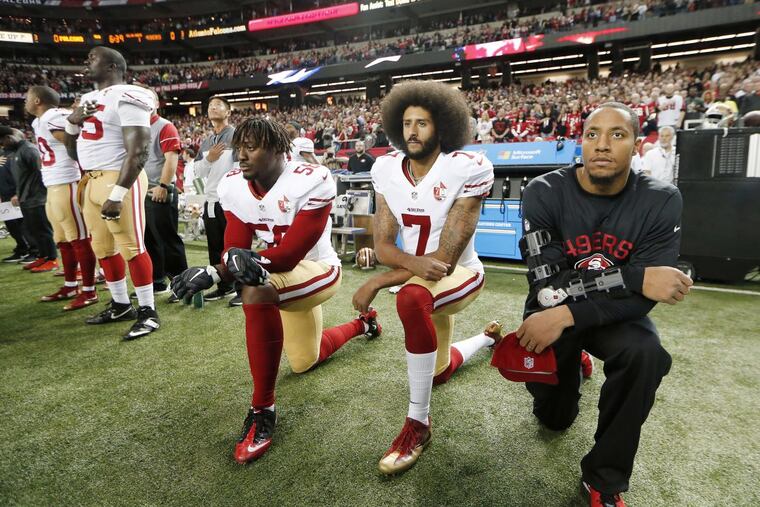Talking to kids about the meaning of 'taking a knee'
It's likely this week your children may ask questions or already have expressed opinions about this form of protest. Here's some advice when talking about this issue.

With the popularity of NFL football and the current controversy over "taking a knee," it's likely this week your children may ask questions or have already expressed opinions about this form of protest. I often recommend that parents respond to tough questions from their kids with questions of their own. If a child asks, "What is 'taking a knee' all about?" I suggest you ask the child what he's heard, what he thinks about it, or what his friends are saying. Rather than trying to explain the whole history of race relations and athletic activism in America, you want to provide the simplest answer or explanation at a level appropriate to the child's development.
Try to help the child understand the topic better or correct misconceptions by offering facts. For example, you might say: "Normally, players stand for the playing of our national anthem at football games. These players are taking a knee to support another former player who took a knee to protest the shooting and mistreatment of unarmed black men by police."
Suppose your kids ask if you agree or disagree with the protest. Your job is not only to answer honestly, but to seize the opportunity to talk about your own personal values and to clearly explain why you hold those values. For example, you could say, whether or not you agree with the athletes, that one of the wonderful aspects of living in a democracy is that we all have the right to freely express our beliefs. If we feel strongly about something, our constitution guarantees us the right to express ourselves and to protest peacefully.
Children may ask about politicians' and broadcasters' views and comments as well. They of course, have the right to express themselves, too. But before you answer, use this as another opportunity to counter with a question: "What do you think about powerful people calling other people names?" Children, depending on their age and maturity, may want you to affirm how they should think. The way they respond will tell you what they need from you – whether it's comfort, reassurance, or clarification. Be sure to verify your family's values about how you talk to and treat people. For example, you might say: "I don't think it's funny when people with a lot of power mock other people or call them names." Put it in perspective from a power imbalance standpoint: "If you saw a fifth-grader teasing and bullying a first-grader, how would you feel about that?"
Older children may come to you about friends and schoolmates who disagree with their point of view on this issue or any issue. Again, the key is to ask as well as answer. Ask the child how she managed a disagreement with a peer. Did she respond and, if so, how did she feel about the exchange? You can also ask teens: "Would you like to know what I think?" Parents may try to reduce their own anxiety about tough issues by giving canned advice. I recommend they resist the urge to dole out advice. It's much better to have a value-clarifying discussion. Outline the facts as they are, your value system and how you demonstrate it, without being pejorative with regard to "the other side."
Having said that, it is getting increasingly difficult to encourage healthy discourse about our differences in this country. It seems we are creating more divisions and making smaller divisions grow. We are on a damaging trajectory. Complaints about hate crimes have skyrocketed over the past several months, according to sources such as the Philadelphia Commission on Human Relations. Even if your children don't bring up the subject of "taking a knee," you may want to talk about it. Parents tend to practice avoidance as a way of managing their discomfort with tough topics. If these issues are important enough to your family, start the conversation.
Roger Harrison, PhD, is a pediatric psychologist at Nemours/Alfred I. duPont Hospital for Children.